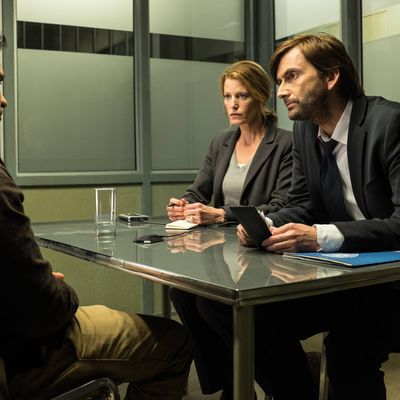
Now, finally, we’re getting somewhere. But where exactly? Good place or bad place? It’s what our broody friend Emmett Carver is likely asking himself, and it’s what we viewers are asking as well. With this episode, Gracepoint starts to develop a distinct and specific personality from Broadchurch (emphasis starts; there’s still a lot of retread here). It’s enough to make you sit up and take notice, but is it enough to save a piece of television that might be crusting over faster than Nick Nolte’s barnacle-blasted voicebox? Let’s see.
Aside, dear reader: Before we address the episode proper, can we talk about Anna Gunn for a minute? I feel reluctant to address her shortcomings, as any shade I throw seems anti-feminist, but it has to be said: She sucks, right? She’s not doing good acting here, and therefore her character is not doing good detective work. So what’s the problem? Maybe the material just didn’t click for her, but any little stand she takes against Tennant’s Carver seems whiny and brittle, even when he’s being a total ASSAHOLIC (callback!). There’s no wellspring of power, no confidence, no warmth, no empathy. She’s not at all your usual tough-but-sexy lady detective, which would be interesting to watch if there was something else behind it — desire? Aspiration? Struggle? But there isn’t. Just empty eyeballs and that drawn, defiant mouth. Every time she tries to take Carver down a peg she just takes herself down instead. Her Miller is so reactive and unhelpful that I am beginning to think she was not promoted because she is a bad policewoman. And not like a Bad Judge or Bad Teacher bad, but just … inadequate. I don’t want her to solve this case. I want her character gone altogether.
Breaking Bad fans, is this why you didn’t like Anna Gunn, too? (Never mind. You’re probably not watching this show or reading this recap.) She was so good in Deadwood! Does she need a crazy showrunner to push her buttons? What is the deal?!
(And for the record, Miller was my favorite character in Broadchurch. Her little spitfire asides were the perfect injection of comedy into a foggy sea of procedural machination, and underlying her inadequacies was a streak of self-confidence, a belief that her disposition and people smarts would get her through. Which of course, it did. Olivia Colman for prime minister, is what I’m saying.)
At any rate, this chapter in our saga sees us closing in on Mark Solano as a suspect — Danny’s blood in his boat, his alibi slippery, his family’s faith shaky. Meanwhile, Renee Clemons tries vainly to make headway with the townsfolk, particularly Nick “Ahab” Nolte, Mark’s apprentice/gun toter Vince, and her local journalist counterpart Owen. Across town, an increasingly agitated Beth finds herself conversing with a purported psychic who’s “spoken” to Danny, and back at the precinct Carver questions Tom Miller, uncovering Mark’s potential for violence toward his late son.
Later Carver’s mysterious illness, and his sour disposition, come into a touch of relief when he tells a visiting doctor friend he’s in Gracepoint for “penance” and has to keep “kicking at the bomb” in his system until he’s done with the case. This the best acted and most well-written scene in the show so far. Actually, the last 15 minutes of the episode felt like they had a gust of wind — dare I say promise? — behind them. NB: Beth and the priest; Emmett and Renee on the street; Gemma’s admission; Beth and the psychic; and Mark and Beth in bed. And I admit that the turning rainbow dial on Carver’s computer as he waited for the mystery number to surface gave me a chill. The plot has finally started to fall away from Broadchurch, and my anticipation of what may come follows it to episode four. Good or bad? Still not sure, honestly. But ready to find out.
The People vs. Gracepoint vs. Broadchurch (Warning: Potential spoilers ahead, or at least spoiler-y questions/observations)
- Have you noticed Carver can’t say Miller without a teeny glance of Tennant’s Scottish brogue leaking in there? Drinking-game alert!
- Compare and contrast: the newsagent scene in Broadchurch versus the scene at Nick Nolte’s fisherman hut here. Discuss.
- In Broadchurch, Beth worked off her frustration by cleaning the tub; here she uses a treadmill in the garage; debates tossing Danny’s shampoo versus tossing his bike. Discuss.
- Our American Beth is slightly edgier and more confrontational than our “English rose” Beth in Broadchurch. The edge is a nice touch.
- The Daily Herald journo, Karen White, is called out as being “AWOL”; we do not yet know whether Renee Clemons has done the same. Discuss.
- Similarly, Owen here is more resistant to helping Renee than Ollie was in Broadchurch. There’s little to no sexual tension. But there is, with Owen, a possible financial motivator toward future transgressions. Discuss.
- Ellie’s late-night confrontation of Carver here is cold and fight-y; in Broadchurch this tension is cut when Ellie asks Alec to dinner. Are we being set up to find Carver and Miller completely on the outs? Discuss.
- The number in Danny’s sweatshirt is a totally new detail. What does it mean?!
- Ellie’s husband’s looks and noises in the interview with Tom and Emmett. What do they mean?!
- As good as this ending was (the turning rainbow of suspense!) I sorely missed the burning boat image from Broadchurch. It was such a potent, on-theme image. The turning rainbow is flaccid by comparison. Yes, I said it: flaccid rainbow.
- There is no sexual tension between Ellie and her husband here. There was a ton of it in Broadchurch. What does it mean?!
- Bonus slow-motion whale tail! Bonus sailboat! But, again, no burning boat … what does it mean?!

